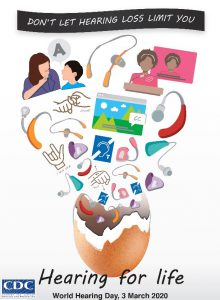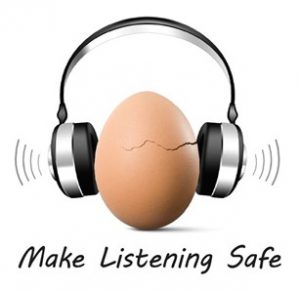World Hearing Day: March 3rd. “Don’t Let Hearing Loss Limit You.”
Posted on by
What is World Hearing Day, and what is it trying to achieve?
Held on March 3rd each year, the World Health Organization’s (WHO) World Hearing Day is the largest global awareness campaign on ear and hearing care. It started in 2007, at the First International Conference on Prevention and Rehabilitation of Hearing Impairment in Beijing, China.
World Hearing Day raises awareness on how to prevent deafness and hearing loss and how to promote ear and hearing care across the world.
The theme for World Hearing Day 2020 is “Don’t Let Hearing Loss Limit You.” CDC supports this opportunity to raise the importance of ear and hearing health that includes hearing protection.
World Hearing Day aims to do the following for ear and hearing care:
- Promote public health action.
- Stimulate partnerships.
- Raise community, national, and international awareness.
- Encourage behavior change.
According to the World Health Organization …
Approximately 466 million people live with disabling hearing loss. An overwhelming reside in low- and middle-income countries and commonly lack access to needed services and interventions. Unaddressed hearing loss costs $750 billion globally each year and is the leading cause of morbidity.

CDC’s Noise-Induced Hearing Loss Program aims to educate about
- What noises cause hearing loss.
- How noise causes hearing loss.
- How to know if you have hearing loss caused by loud noise.
- How to prevent loud noise from damaging your hearing.
- What to do if you suspect you have hearing loss.
We can all think of obvious causes of hearing loss: fireworks, sporting events, and loud concerts. However, you may be surprised to learn that everyday activities can damage hearing: using power tools, mowing the lawn, or attending a fitness class with loud music.
Think that hearing damage is usually workplace-related? Actually, activities away from work can damage hearing just as much a noisy job. Over half of all adults with hearing damage do not have noisy jobs.
Repeated exposure to loud noise over the years can damage your hearing. The average person is born with about 16,000 hair cells in their inner ear. These cells allow your brain to detect sounds. By the time changes in your hearing can be measured by a hearing test, up to 30% to 50% of hair cells have been damaged or destroyed. Damaged inner ear cells do not grow back.
Signs that you may have hearing loss include difficulty hearing high-pitched sounds (e.g., doorbell, telephone, alarm clock) and difficulty understanding conversations in a noisy place. If you need to raise your voice to make yourself heard, you may have hearing loss.
Ways to protect your hearing include turning the volume down, of course, taking periodic breaks from noise, and using hearing protection such as earplugs or noise-cancelling earmuffs.
Get your hearing checked! Hearing loss is the third most common chronic health condition in the United States. Almost twice as many people report hearing loss as report diabetes or cancer. In the United States, about 40 million adults aged 20–69 years have noise-induced hearing loss, and about 1 in 4 adults who report “excellent to good” hearing already have hearing damage. There is no cure for hearing loss! Protect your hearing, and if you already have hearing loss, take steps to keep it from getting worse.
Tweet this: Help the WHO and CDC promote World Hearing Day 2020 on March 3. “Don’t Let Hearing Loss Limit You.” Help promote “Hearing for Life.” #WorldHearingDay #hearingcare #safelistening
Additional Information
CDC: Loud Noise Can Cause Hearing Loss
WHO: World Health Organization: Deafness Prevention, World Hearing Day
Tweet this: “World Hearing Day 2020 on March 3. “Don’t Let Hearing Loss Limit You.” Help promote “Hearing for Life.” https://bit.ly/2HKxVJq #WorldHearingDay #hearingcare #safelistening”
One comment on “World Hearing Day: March 3rd. “Don’t Let Hearing Loss Limit You.””
Comments listed below are posted by individuals not associated with CDC, unless otherwise stated. These comments do not represent the official views of CDC, and CDC does not guarantee that any information posted by individuals on this site is correct, and disclaims any liability for any loss or damage resulting from reliance on any such information. Read more about our comment policy ».


Please Help , To Stop Religious Noise Pollution In Sri Lanka !!!